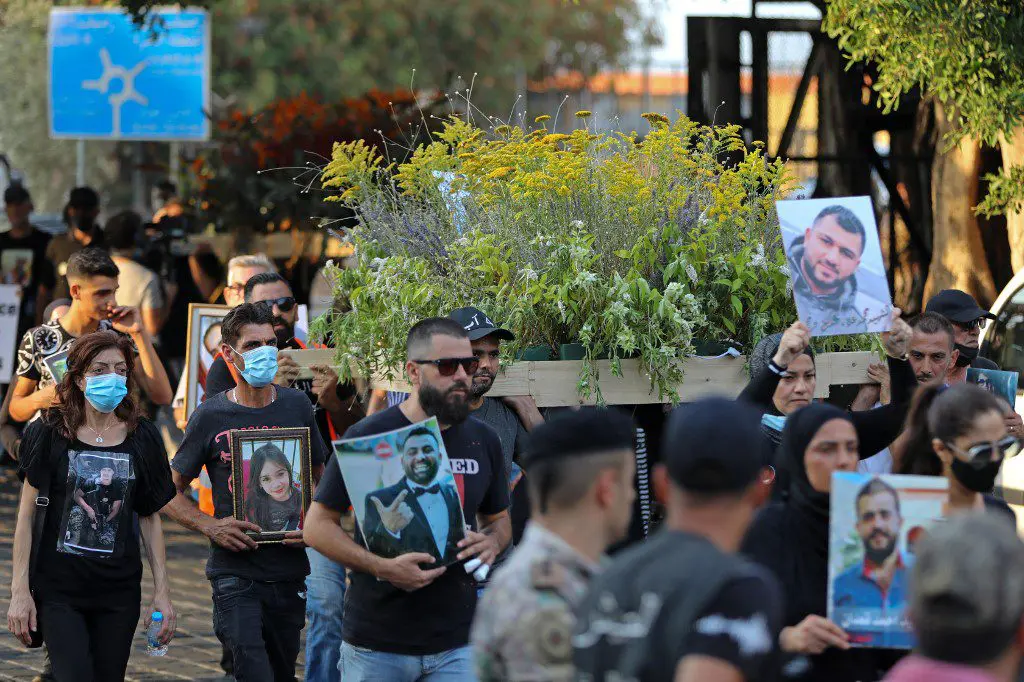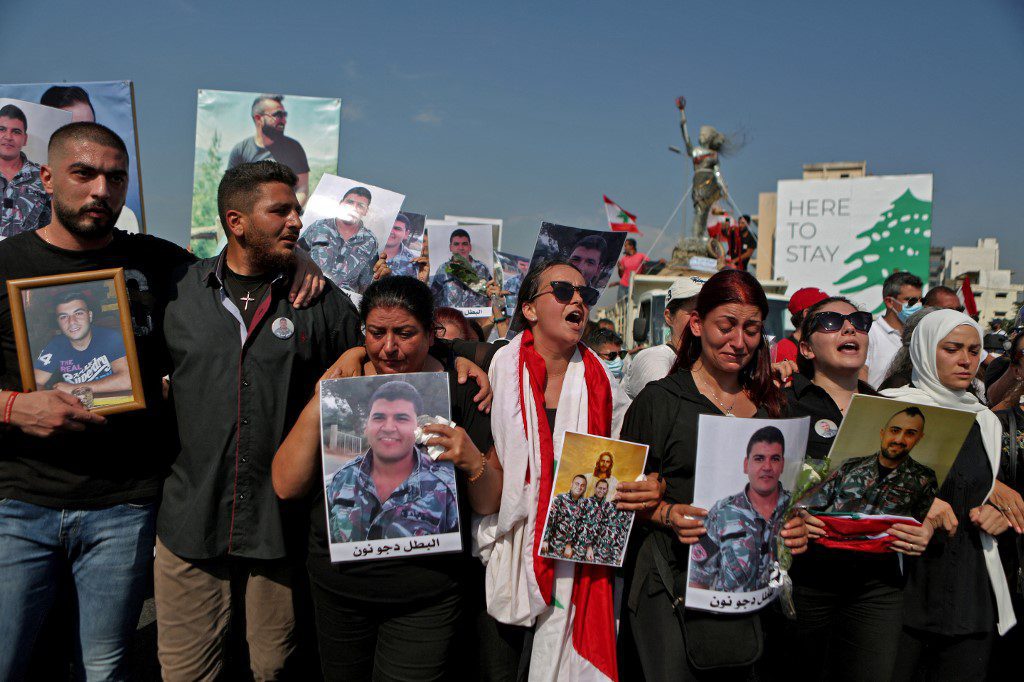
Mat Nashed
Nobody has been punished for the cataclysmic blast that ripped through Lebanon’s capital of Beirut on August 4, 2020. That day, 2,750 tons of highly volatile ammonium nitrate detonated, leaving a crater nearly 15 yards deep in the port. The explosion shattered houses and buildings miles away and rendered thousands of people homeless. The final death toll remains uncertain, but roughly more than 200 people – men, women and children – were killed.
More than a year later, victims’ families remain hungry for justice, yet Lebanon’s ruling class is blatantly obstructing an investigation to shield them from accountability
There is plenty of blame to go around, according to a recent investigation by Human Rights Watch (HRW), which is based on 700 pages of findings and documents. The report found strong evidence that implicates Lebanese President Michel Aoun, caretaker prime minister Hassan Diab, and the director general of state security Tony Saliba. The report said that those men were among a number of high officials that knew about the dangers that ammonium nitrate posed, yet they did nothing to remove it from the port.
Less than two weeks before the blast, State Security gave Diab and Aoun a report that explicitly warned about the ammonium nitrate stored in the port. Diab justified his negligence by telling HRW that State Security reports usually aren’t accurate. “Three quarters of the time, the information is not correct,” he said.
Aoun added, “If you want to hold me accountable, that means you must also hold those responsible for all who are under the President of the Republic.
So far, there have been clear attempts to do just that. In August 2020, the High Judicial Council (HJC) – a ten judge panel mostly chosen by the country’s ruling class – elected to entrust the investigation to Judge Fadi Sawan.
As an independent figure, Swan was charged with an enormous task: his mandate was to determine the cause of the explosion, and to press criminal charges on those he deemed responsible for offloading the chemicals in Beirut, storing them at the port, and failing to relocate the ammonium nitrate to a safe location for seven years.
With how compromised the judicial system is in Lebanon, victims’ families feared that Sawan would kowtow to the political class by merely prosecuting low-level officials. But on December 10, 2020, Sawan boldly charged Diab and three former ministers – two who are sitting members in parliament – with negligence.
Two of the ministers charged – Ali Hassan Khalil and Ghazi Zeaiter – refused to be interviewed as suspects and quickly accused Judge Sawan of overstepping his boundaries.
The same ministers argued that their parliamentary immunity protected them from criminal charges and that Judge Sawan was not an objective investigator since his own house was destroyed in the blast – just like hundreds of thousands of other Beirut residents.
Sure enough, on February 18, 2021, the HJC dismissed Sawan from the probe. The decision angered victims’ families, many of whom gathered outside the Justice Palace with photos of their dead loved ones. While crying on the ground, one woman told Reuters that she had been clinging to hope that some justice would be served until Sawan was removed. “We are truly in a rotted country…I swear we’re tired. We want the truth.”

The outrage prompted the HJC to quickly appoint a new judge, Tarek Bitar, to head a new investigation. Bitar’s first move was releasing six people, including an officer that submitted a detail warning to top officials prior to the explosion.
Two months later, Bitar courageously requested permission to investigate a number of MPs and high-level security officials. Ghazi Zeaiter was again among the list of suspects, but now along with Finance Minister Ali Hassan Khalil and former Interior Minister Nouhad Machnouk. Bitar also requested to investigate the head of General Security Directorate Major General Abbas Ibrahim and State Security Major General Tony Saliba.
As expected, parliament has refused to lift the immunity on Zeaiter and Machnouk. Interior Minister Mohammad Fahmi also denied Bitar’s request to prosecute Ibrahim, prompting Bitar to quickly appeal the decision with the Cassation Court. The head of that court, Attorney General Ghassan Khoury, told HRW that he upheld Fahmi’s decision. Meanwhile, neither Prime Minister Diab, nor Michael Aoun, nor the High Defence Council has given an answer on whether to allow Bitar to interrogate Saliba.
In another act of defiance, protesters gathered in front of the interior ministry on July 13, 2021 to spray the word killer on the entrance of the building. They refused to leave until Fahmi fulfilled Bitar’s request. But instead of giving in, security forces began dispersing the crowd with tear gas.
Rather than condemn the violence, political factions are trying to discredit Bitar, just as they did to Judge Sawan. Hezbollah’s leader Hassan Nasrallah recently claimed that Bitar is politicizing the investigation. The reasoning for the slander is clear: Each member of the ruling elite fears that they could eventually lose their license of impunity if they hand over top officials to Bitar.
The investigation into the port-blast challenges the very fabric of Lebanon’s sectarian oligarchy, whereby each political figure protects his rival from accountability to protect himself. That has been the logic since the end of Lebanon’s 15-year-civil war in 1990, which saw warlords convert their constituencies into political clients while absolving one another of accountability.
To do so, the ruling class adopted what many experts call a policy of “collective amnesia” in Lebanon – a status-quo of purposefully not revisiting events or atrocities that took place during the war. Political factions wish that Lebanon could adopt that same amnesia in the aftermath of the blast. But this time, victims’ families won’t rest until they get answers, nor until every single person implicated in the crime is punished.


